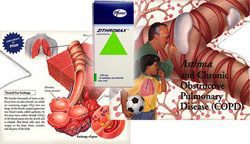
Pfizer Inc. has been hit with a warning letter from federal health regulators over a brochure the company used to promote its Zithromax antibiotic. According to a U.S. Food & Drug Administration (FDA) warning letter dated June 19, 2012, the Zithromax brochure was deemed false and misleading because it: Omitted and minimized important Zithromax risk […]
 Pfizer Inc. has been hit with a warning letter from federal health regulators over a brochure the company used to promote its Zithromax antibiotic. According to a U.S. Food & Drug Administration (FDA) warning letter dated June 19, 2012, the Zithromax brochure was deemed false and misleading because it:
Pfizer Inc. has been hit with a warning letter from federal health regulators over a brochure the company used to promote its Zithromax antibiotic. According to a U.S. Food & Drug Administration (FDA) warning letter dated June 19, 2012, the Zithromax brochure was deemed false and misleading because it:
The FDA warning letter refers to a form of Zithromax sold under the name ZMax (azithromycin extended release for oral suspension). Zithromax is also popularly known as ZPak.
FDA Warning Letter
According to a report from Pharmalot, the FDA Zithromax warning letter cited, among other things, the brochure’s omission of an “important risk of QT prolongation associated with ZMax use.” The brochure also minimizes risks associated with usage by failing to disclose that severe and fatal allergic and skin reactions have been observed” with Zithromax. The FDA also said the brochure emphasized efficiency over risk because it “prominently presents efficacy claims in large bolded font size and in colorful text and graphics surrounded by a significant amount of white space. In contrast, the risk information is placed in obscure locations, in block paragraph format, without the use of headers or other signals to alert readers to its significance.”
The FDA also slammed the brochure’s claim that “Zmax is different from other drugs, because it’s not released in the stomach. Zmax goes to work in the small intestine so it’s easier on the stomach. Unlike many other drugs, you should take Zmax on an empty stomach.” The FDA cited a lack of research to support the contention and the fact that the Zithromax prescribing information states that vomiting, diarrhea, loose stools, and abdominal pain were the most common adverse events reported in pediatric studies.
Zithromax Side Effects
According to the FDA, Zithromax (azithromycin) belongs to a class of antibacterial drugs called macrolides, which have been associated with cardiovascular effects; specifically, prolongation of the QT interval. Prolongation of the QT interval can lead to torsades de pointes (TdP), an abnormal heart rhythm, which can be fatal.
This past May, the New England Journal of Medicine (NEJM) published a study which found that patients taking Zithromax faced an doubled risk of death from sudden heart problems compared to people using no antibiotic, or those taking alternative antibioticsThe highest risks were seen in Zithromax patients with existing heart problems. The FDA is currently reviewing the NEJM Zithromax study, and has advised physicians to be aware that Zithromax has the potential to cause potentially deadly heart arrhythmias.


